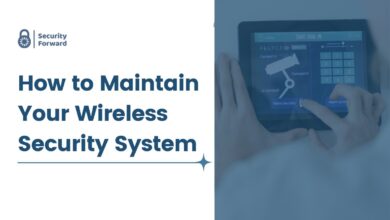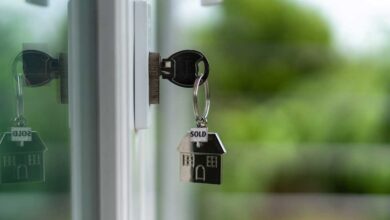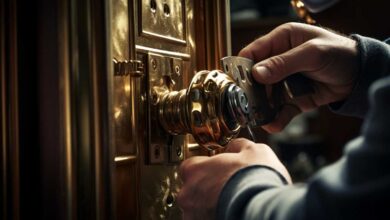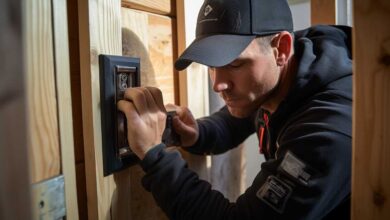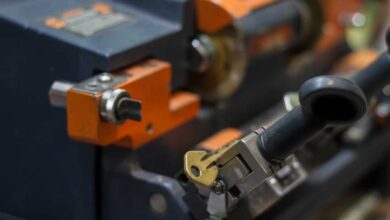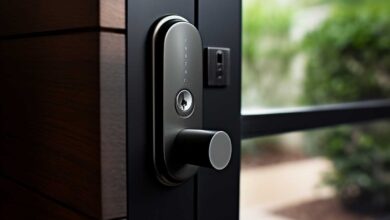Cost Estimation For Home Lock Replacement
KEY TAKEAWAYS
One of the most critical components ensuring home security is the humble lock on your door. However, like all things, locks wear out, become outdated, or simply need a replacement for enhanced security. Understanding the cost estimation for home lock replacement is essential for homeowners to budget effectively and prioritize their home’s security.
Explore the comprehensive guide on home lock replacement costs. Dive into factors like brand quality and advanced features.
Why Lock Replacement Is Essential
Locks are the first line of defense against potential intruders. Over time, they can wear out, making them easier to pick or break. Additionally, technological advancements mean that newer lock models offer enhanced security features that older models might lack. Regularly updating and replacing locks ensures that a home remains as secure as possible.
Factors Influencing The Cost Of Lock Replacement
There are several factors that can influence the cost of lock replacement, and it’s vital to understand them before proceeding with the lock replacement.
Type Of Lock
There are various types of locks available in the market, each with its price range. Traditional deadbolts might cost less than advanced electronic or smart locks. The choice of lock often depends on the level of security desired and the budget allocated.
Labor Costs
While some homeowners might feel comfortable replacing locks themselves, many prefer hiring professionals. The cost of labor can vary based on the complexity of the lock system and the region where one resides.
Brand And Quality
Not all locks are created equal. Opting for a reputable brand often means a higher upfront cost but can result in better security and longer lifespan of the lock.
Additional Features
Modern locks come with a range of features, from biometric access to remote control via smartphone apps. While these features offer enhanced security and convenience, they can also add to the overall cost of the lock.
Types Of Locks And Their Replacement Costs
Locks are essential in providing security for homes and businesses. The cost of replacing these locks varies depending on the type of lock, the complexity of the installation, and the rates of the locksmith.
Standard Locks
Standard locks, often referred to as traditional or conventional locks, are the most common types found in many homes. They typically include pin tumbler locks and are operated with a key.
Replacement Costs: The cost for replacing standard locks ranges from $50 to $150, including labor. The price can vary based on the brand, design, and where you purchase it.
Considerations: While they are the most affordable option, standard locks might not offer the highest level of security. They can be susceptible to picking or bumping, so homeowners looking for enhanced security might consider upgrading.
High-Security Locks
High-security locks are designed to offer an added layer of protection against picking, drilling, or bumping. They often come with unique keys that are difficult to duplicate without proper authorization.
Replacement Costs: These locks are a bit pricier, with replacement costs ranging from $100 to $500, depending on the brand and specific features.
Considerations: The initial investment in high-security locks can be higher, but the enhanced security they offer can be invaluable, especially in areas with higher crime rates.
Electronic Locks
Electronic locks operate without a traditional key. Instead, they use a keypad where a code is entered or a card is swiped to gain access.
Replacement Costs: The cost for electronic locks can range from $150 to $400. Factors influencing the price include the brand, features, and installation complexity.
Considerations: While electronic locks offer a higher level of convenience, they can be vulnerable to hacking. It’s essential to choose models with built-in security features and regularly update passcodes.
Smart Locks
Smart locks represent the latest in lock technology. They can be controlled remotely via smartphone apps, offer access logs, and can integrate with other smart home systems.
Replacement Costs: Smart locks are on the higher end of the price spectrum, with costs ranging from $200 to $600 or more, depending on the features and brand.
Considerations: Smart locks offer unparalleled convenience and control. However, they rely on power (batteries or mains) and an internet connection. It’s crucial to ensure they are regularly updated to protect against potential cyber threats.
Average Costs For Home Lock Replacement
When considering the replacement of home locks, it’s essential to factor in both the cost of the lock itself and the labor associated with its installation. Here’s a breakdown of the average costs homeowners might expect:
Lock Costs
-
Standard Locks: These are the most common and typically range from $30 to $60 per lock. They are readily available at most hardware stores.
-
High-Security Locks: Designed with advanced security features, these locks can range from $100 to $300, depending on the brand and specific features.
-
Electronic Locks: These locks, which operate with a keypad or card, typically cost between $100 and $300.
-
Smart Locks: Being the latest in lock technology, smart locks can range from $150 to $500 or more, depending on their features and integration capabilities.
Labor Costs
The labor costs for lock replacement can vary based on several factors:
-
Locksmith Rates: The average hourly rate for a locksmith in the U.S. ranges from $50 to $100. However, many locksmiths charge a flat fee for home lock replacement, which can range from $80 to $200, including the cost of the lock.
-
Complexity Of Installation: Advanced locks, especially smart locks, might require more time for installation, driving up labor costs.
-
Emergency Services: If you’re locked out and require immediate assistance, emergency locksmith services can be more expensive, often carrying a premium of 50% or more.
-
Travel Fees: If you live in a remote area, some locksmiths might charge an additional travel fee.
Brand And Quality
The brand and quality of a lock play a significant role in determining its cost. Here’s a breakdown of the average costs based on brand reputation and quality:
-
Generic Brands: These are often manufactured in bulk and might not undergo rigorous quality checks. They are the most affordable option, with prices ranging from $20 to $50.
-
Mid-Tier Brands: These brands offer a balance between cost and quality. They often have better build quality and more security features than generic brands. Prices typically range from $50 to $150.
-
Premium Brands: Renowned for their superior quality, durability, and advanced security features, these locks are an investment in your home’s security. The cost for premium brand locks can range from $150 to $500 or more.
Considerations: While premium brands come with a higher price tag, they often offer warranties, better customer support, and a proven track record of security and durability. The initial investment can lead to fewer replacements in the long run and enhanced peace of mind.
Additional Features
The modern era has ushered in a range of advanced features for locks, enhancing both security and convenience. Here’s an overview of some popular features and their associated costs:
-
Biometric Access: Locks with fingerprint or facial recognition offer a keyless entry and heightened security. These features can add an additional $50 to $200 to the base price of the lock.
-
Remote Control via Smartphone Apps: The ability to lock or unlock your door remotely can add between $40 to $150 to the lock’s cost.
-
Voice Control Integration: Locks that integrate with smart home systems like Amazon Alexa or Google Assistant can add an extra $30 to $100.
-
Tamper Alarms: Some modern locks come equipped with alarms that sound if someone tries to tamper with or force the lock. This feature can add $20 to $80 to the lock’s price.
-
Guest Access Features: The ability to provide temporary access codes or digital keys for guests can increase the lock’s cost by $20 to $70.
Considerations: While these advanced features can increase the initial cost of the lock, they offer unparalleled convenience and enhanced security. Homeowners should evaluate their specific needs and decide which features are essential for their lifestyle and security concerns.
Additional Potential Costs
-
Key Duplication: If you need additional keys, there might be a charge ranging from $2 to $10 per key, depending on the type and complexity.
-
Lock Rekeying: Instead of replacing the entire lock, some homeowners opt to rekey their existing locks. This process can cost between $40 to $100 per lock, plus labor.
-
Upgrades And Add-Ons: Features like anti-drill plates, security chains, or surveillance systems can add to the overall cost.
Frequently Asked Questions
We have addressed some of the most commonly asked queries to provide you get a better cost estimation for home lock replacement.
What is the difference between rekeying and lock replacement?
Rekeying involves altering the internal mechanism of your existing lock so it functions with a new key. It’s a cost-effective way to ensure security without changing the entire lock. On the other hand, lock replacement entails removing the old lock entirely and installing a new one, which might be necessary if the lock is damaged or if you’re looking for an upgrade in security features.
How often should I consider replacing my home locks?
Generally, it’s recommended to replace home locks every 5-7 years. However, if you notice signs of wear, experience difficulty in locking or unlocking, or have recently had a security breach, it might be prudent to replace them sooner. Regular maintenance can also extend the lifespan of your locks.
Are smart locks more secure than traditional locks?
Smart locks provide advanced features like remote access and user logs, enhancing convenience. Their security level, however, depends on factors like encryption standards, build quality, and user practices. While they can offer robust security, it’s essential to keep software updated and use strong, unique passcodes to prevent potential breaches.
Can I install a new lock myself or should I hire a professional?
While many locks come with DIY installation kits, the process can be intricate. A professional locksmith not only ensures correct installation but can also assess the door’s integrity and offer insights into optimal security. If security is a top priority, it’s advisable to seek professional assistance.
How do I choose the best brand or quality of lock for my home?
Start by assessing your security needs and budget. Research various brands, read customer reviews, and perhaps consult with a locksmith. Brands with a longstanding reputation often provide reliable performance, but it’s also essential to consider the lock’s specific features and the warranty provided.
Are electronic and biometric locks safe from hacking?
Electronic and biometric locks utilize advanced technology, but like all tech-based systems, they can be vulnerable to sophisticated hacking attempts. To mitigate risks, choose locks with strong encryption standards, regularly update any associated software, and employ multi-factor authentication when possible.
Understanding The Costs Of Home Lock Replacement
Ensuring the security of one’s home is a top priority for every homeowner. By understanding the costs associated with lock replacement and effectively budgeting for it, homeowners can ensure that their sanctuaries remain safe and secure. While the initial investment can vary significantly based on the type of lock, it’s essential to consider both the immediate cost and the long-term value in terms of security and convenience. By understanding the different types of locks and their associated costs, homeowners can make informed decisions that best suit their needs and budget.
Discover more about how to keep your house and family safe by reading our in-depth guide on the cost considerations for home lock repair. For additional information, visit Security Forward and explore our resources and guides.
